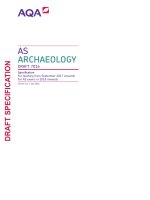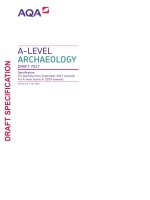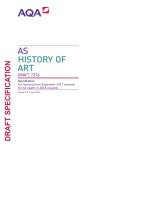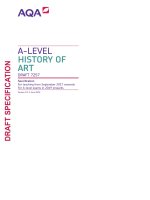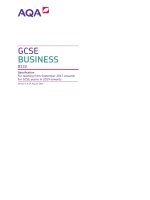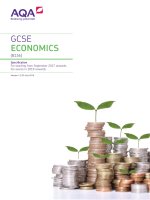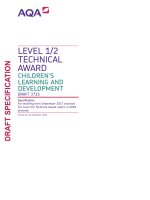AQA 7172 SP 2017 v0 1
Bạn đang xem bản rút gọn của tài liệu. Xem và tải ngay bản đầy đủ của tài liệu tại đây (1.77 MB, 26 trang )
DRAFT 7172
T
Specification
For teaching from September 2017 onwards
For A-level exams in 2019 onwards
R
AF
Version 0.1 2 June 2016
D
DRAFT SPECIFICATION
A-LEVEL
PHILOSOPHY
DRAFT SPECIFICATION
T
AF
R
D
A-level Philosophy DRAFT 7172. A-level exams June 2019 onwards. Version 0.1 2 June 2016
Contents
1 Introduction
5
5
5
6
1.1 Why choose AQA for A-level Philosophy
1.2 Support and resources to help you teach
1.3 Draft specification
7
2.1 Subject content
2.2 Assessments
7
7
3 Subject content
9
10
12
15
17
AF
T
3.1 Epistemology
3.2 Moral philosophy
3.3 Metaphysics of God
3.4 Metaphysics of mind
4 Scheme of assessment
R
4.1 Aims
4.2 Assessment objectives
4.3 Assessment weightings
5 General administration
5.1 Entries and codes
5.2 Overlaps with other qualifications
5.3 Awarding grades and reporting results
5.4 Re-sits and shelf life
5.5 Previous learning and prerequisites
5.6 Access to assessment: diversity and inclusion
5.7 Working with AQA for the first time
5.8 Private candidates
D
DRAFT SPECIFICATION
2 Specification at a glance
21
21
21
22
23
23
23
23
23
24
24
24
25
Visit aqa.org.uk/7172 for the most up-to-date specification, resources, support and administration 3
•
•
You will always find the most up-to-date version of this specification on our website at
aqa.org.uk/7172
We will write to you if there are significant changes to the specification.
4 Visit aqa.org.uk/7172 for the most up-to-date specification, resources, support and administration
DRAFT SPECIFICATION
T
AF
R
D
Are you using the latest version of this specification?
A-level Philosophy DRAFT 7172. A-level exams June 2019 onwards. Version 0.1 2 June 2016
1 Introduction
1.1 Why choose AQA for A-level Philosophy
Our new AS and A-level Philosophy qualifications are designed to give your students a thorough
grounding in the key concepts and methods of philosophy. Students will have the opportunity to
engage with big questions in a purely secular context. Our qualifications are fully co-teachable, so
you can teach AS and A-level students in the same class.
T
Your students will develop important skills that they need for progression to higher education.
They’ll learn to be clear and precise in their thinking and writing. They will engage with complex
texts, analysing and evaluating the arguments of others and constructing and defending their own
arguments.
The specification
AF
We’ve designed these qualifications with help from teachers and subject experts. We’ve looked to
minimise content changes, providing continuity from our current AS and A-level specifications so
you’ll find a mix of familiar topics. We have introduced some updated content to ensure that the
work of women philosophers is represented.
Clear, well-structured exams
R
We’ve retained the structure and layout of our AS and A-level question papers and mark schemes
providing continuity with the current specifications.
You can find out about all our Philosophy qualifications at aqa.org.uk/philosophy
D
DRAFT SPECIFICATION
Designed for you and your students
1.2 Support and resources to help you teach
We’ve worked with experienced teachers to provide you with a range of resources that will help
you confidently plan, teach and prepare for exams.
1.2.1 Teaching resources
Visit aqa.org.uk/7172 to see all our teaching resources. They include:
•
•
•
•
a thorough anthology to help you access the set texts
sample schemes of work to help you plan your course with confidence
training courses to help you deliver AQA Philosophy qualifications
subject expertise courses for all teachers, from newly qualified teachers who are just getting
started to experienced teachers looking for fresh inspiration.
1.2.2 Preparing for exams
Visit aqa.org.uk/7172 for everything you need to prepare for our exams, including:
Visit aqa.org.uk/7172 for the most up-to-date specification, resources, support and administration 5
• past papers, mark schemes and examiners’ reports
• specimen papers and mark schemes for new courses
• example student answers with examiner commentaries.
1.2.3 Analyse your students' results with Enhanced Results Analysis
(ERA)
Find out which questions were the most challenging, how the results compare to previous years
and where your students need to improve. ERA, our free online results analysis tool, will help you
see where to focus your teaching. Register at aqa.org.uk/era
1.2.4 Keep your skills up-to-date with professional development
Wherever you are in your career, there’s always something new to learn. As well as subject
specific training, we offer a range of courses to help boost your skills.
T
• Improve your teaching skills in areas including differentiation, teaching literacy and meeting
Ofsted requirements.
• Prepare for a new role with our leadership and management courses.
AF
You can attend a course at venues around the country, in your school or online – whatever suits
your needs and availability. Find out more at coursesandevents.aqa.org.uk
1.2.5 Help and support
Visit our website for information, guidance, support and resources at aqa.org.uk/7172
R
If you'd like us to share news and information about this qualification, sign up for emails and
updates at aqa.org.uk/from-2017
Alternatively, you can call or email our subject team direct.
D
E:
T: 01483 477 822
1.3 Draft specification
This draft qualification has not yet been accredited by Ofqual. It is published to enable teachers to
have early sight of our proposed approach to A-level Philosophy. Further changes may be required
and no assurance can be given that this proposed qualification will be made available in its current
form, or that it will be accredited in time for first teaching in September 2017 and first award in
August 2019.
6 Visit aqa.org.uk/7172 for the most up-to-date specification, resources, support and administration
DRAFT SPECIFICATION
For information about results, including maintaining standards over time, grade boundaries and our
post-results services, visit aqa.org.uk/results
A-level Philosophy DRAFT 7172. A-level exams June 2019 onwards. Version 0.1 2 June 2016
2 Specification at a glance
This qualification is linear. Linear means that students will sit all their exams at the end of the
course.
1. Epistemology
2. Moral philosophy
3. Metaphysics of God
4. Metaphysics of mind
Paper 1: Epistemology and moral philosophy
Sections 1 and 2
How it's assessed
Questions
R
• Written exam: 3 hours
• 100 marks
• 50% of A-level
AF
What's assessed
T
2.2 Assessments
• Section A: Five questions on epistemology
• Section B: Five questions on moral philosophy
D
DRAFT SPECIFICATION
2.1 Subject content
Visit aqa.org.uk/7172 for the most up-to-date specification, resources, support and administration 7
Paper 2: The metaphysics of God and the metaphysics of mind
What's assessed
Sections 3 and 4
How it's assessed
• Written exam: 3 hours
• 100 marks
• 50% of A-level
D
R
AF
T
• Section A: Five questions on the metaphysics of God
• Section B: Five questions on the metaphysics of mind
8 Visit aqa.org.uk/7172 for the most up-to-date specification, resources, support and administration
DRAFT SPECIFICATION
Questions
A-level Philosophy DRAFT 7172. A-level exams June 2019 onwards. Version 0.1 2 June 2016
3 Subject content
A-level philosophy comprises four topic areas: Epistemology, Moral philosophy, the Metaphysics of
God and the Metaphysics of mind.
At the end of each topic is a list of texts related to that topic. Students must demonstrate an
understanding of, and the ability to make a reasoned evaluation of, the arguments set out in those
texts. Where a particular section of text is specified, students are not expected to be familiar with
arguments beyond that section. Credit is available, where appropriate, for students whose
responses demonstrate wider reading and understanding, but full credit is available for students
who don’t go beyond the specified section(s).
AF
assertion/claim, proposition
antecedent/consequent
analytic/synthetic
a priori/a posteriori
necessary/contingent
consistent/inconsistent
objective/subjective
tautology
dilemma
paradox
prove/proof
true/false
justification
R
•
•
•
•
•
•
•
•
•
•
•
•
•
T
Students must also demonstrate understanding of and be able to use philosophical terminology
correctly. In addition to the philosophical terminology set out in each section, students must
understand and be able to use the following philosophical terminology:
D
DRAFT SPECIFICATION
Students are required to demonstrate knowledge and understanding of the content, including
through the use of philosophical analysis (conceptual analysis and argument analysis). They must
also be able to analyse and evaluate the philosophical arguments within the subject content to
form reasoned judgements.
Students must also understand and be able to use the language of argumentation correctly and be
able to:
• identify argument within text
• identify the structure of an argument: premises (including assumptions), reasons, conclusions
(including sub-conclusions) and inferences
• identify different forms of argument – including deduction and induction (including abduction) –
and be able to analyse and evaluate arguments in ways appropriate to their form (including in
terms of validity/invalidity, soundness/unsoundness, certainty/probability)
• recognise and deal appropriately with different types of arguments/reasoning, including
arguments from analogy and hypothetical reasoning (including the use of Ockham’s Razor)
• recognise and deal appropriately with flaws in argument, including circularity, contradictions,
question-begging and other fallacies
• use examples and counter-examples
• generate arguments, objections and counter-arguments.
Visit aqa.org.uk/7172 for the most up-to-date specification, resources, support and administration 9
The subject content sets out what should be taught and learned. Where particular subject content
is marked with an ie (that is), then that content must be taught. Ie (that is) is used to clarify
precisely what is meant by specific content.
3.1 Epistemology
3.1.1 What is knowledge?
The tripartite view
Propositional knowledge is defined as justified true belief: S knows that p if and only if:
Issues with the tripartite view including:
T
1. S is justified in believing that p,
2. p is true and
3. S believes that p (individually necessary and jointly sufficient conditions)
R
AF
• the conditions are not individually necessary
• the conditions are not sufficient – cases of lucky true beliefs (including Edmund Gettier’s original
two counter examples):
• responses: alternative post-Gettier analyses/definitions of knowledge including:
• strengthen the justification condition (ie infallibilism)
• add a 'no false lemmas' condition (J+T+B+N)
• replace 'justified' with 'reliably formed' (R+T+B) (ie reliabilism)
• replace 'justified' with an account of epistemic virtue (V+T+B).
D
3.1.2 Perception as a source of knowledge
Direct realism
The immediate objects of perception are mind-independent objects and their properties
Issues including:
•
•
•
•
the argument from illusion
the argument from perceptual variation
the argument from hallucination
the time-lag argument
and responses to these issues.
Indirect realism
The immediate objects of perception are mind-dependent objects (sense-data) that are caused by
and represent mind-independent objects.
• John Locke's primary/secondary quality distinction.
Issues including:
10 Visit aqa.org.uk/7172 for the most up-to-date specification, resources, support and administration
DRAFT SPECIFICATION
• The distinction between acquaintance knowledge, ability knowledge and propositional
knowledge.
• The nature of definition (including Linda Zagzebski) and how propositional knowledge may be
analysed/defined.
A-level Philosophy DRAFT 7172. A-level exams June 2019 onwards. Version 0.1 2 June 2016
• the argument that it leads to scepticism about the existence of mind-independent objects.
Responses including:
• Locke's argument from the involuntary nature of our experience
• the argument from the coherence of various kinds of experience, as developed by Locke and
Catharine Trotter Cockburn (attrib)
• Bertrand Russell's response that the external world is the 'best hypothesis'
• the argument from George Berkeley that we cannot know the nature of mind-independent
objects because mind-dependent ideas cannot be like mind-independent objects.
Berkeley's Idealism
• Arguments for idealism including Berkeley's attack on the primary/secondary quality distinction
and his 'Master' argument.
Issues including:
and responses to these issues.
AF
T
• arguments from illusion and hallucination
• idealism leads to solipsism
• problems with the role played by God in Berkeley's Idealism (including how can Berkeley claim
that our ideas exist within God's mind given that he believes that God cannot feel pain or have
sensations?)
3.1.3 Reason as a source of knowledge
Innatism
R
Arguments from Plato (ie the 'slave boy' argument) and Gottfried Leibniz (ie his argument based on
necessary truths).
Empiricist responses including:
D
DRAFT SPECIFICATION
The immediate objects of perception (ie ordinary objects such as tables, chairs, etc) are minddependent objects.
• Locke's arguments against innatism
• the mind as a 'tabula rasa' (the nature of impressions and ideas, simple and complex concepts)
and issues with these responses.
The intuition and deduction thesis
•
•
•
•
The meaning of ‘intuition’ and ‘deduction’ and the distinction between them.
René Descartes’ notion of ‘clear and distinct ideas’.
His cogito as an example of an a priori intuition.
His arguments for the existence of God and his proof of the external world as examples of a
priori deductions.
Empiricist responses including:
• responses to Descartes' cogito
• responses to Descartes' arguments for the existence of God and his proof of the external world
(including how Hume's Fork might be applied to these arguments)
and issues with these responses.
Visit aqa.org.uk/7172 for the most up-to-date specification, resources, support and administration 11
• Particular nature of philosophical scepticism and the distinction between philosophical
scepticism and normal incredulity.
• The role/function of philosophical scepticism within epistemology
• The distinction between local and global scepticism and the (possible) global application of
philosophical scepticism
• Descartes’ sceptical arguments (the three ‘waves of doubt’)
• Responses to scepticism: the application of the following as responses to the challenge of
scepticism:
• Descartes' own response
• empiricist responses (Locke, Berkeley and Russell)
• direct realism
• reliabilism.
Set texts
Berkeley, George (1713), Three Dialogues Between Hylas and Philonous
T
Descartes, René (1641), Meditations on First Philosophy, 1, 2, 3, 5, 6
Gettier, Edmund (1963), ‘Is Justified True Belief Knowledge?’ Analysis, 23(6): 121–123
AF
Hume, David (1748), An Enquiry Concerning Human Understanding, Section 2 and Section 4 (part
1)
Leibniz, Gottfried Wilhelm (1705), New Essays on Human Understanding, Preface and Book 1
Locke, John (1690), An Essay Concerning Human Understanding, Book 1 (esp. Chapter 2), Book
2 (esp. Chapters 1, 2, 8 and 14), Book 4 (esp. Chapter 11)
R
Plato, Meno, from 81e
Russell, Bertrand (1912), The Problems of Philosophy, Chapters 1, 2
D
Trotter Cockburn, Catharine (1732), (attrib) ‘A Letter from an anonymous writer to the author of the
Minute Philosopher’ Appendix to G Berkeley Theory of Vision Vindicated and Explained
Zagzebski, Linda (1999), ‘What is Knowledge?’ in John Greco & Ernest Sosa (eds.), The Blackwell
Guide to Epistemology 92 –116
3.2 Moral philosophy
3.2.1 Normative ethical theories
• The meaning of good, bad, right, wrong within each of the three approaches specified below
• Similarities and differences across the three approaches specified below
Utilitariansim
• The question of what is meant by 'utility' and 'maximising utility', including:
• Jeremy Bentham's quantitative hedonistic utilitarianism (his utility calculus)
• John Stuart Mill’s qualitative hedonistic utilitarianism (higher and lower pleasures) and his
‘proof’ of the greatest happiness principle
• non-hedonistic utilitarianism (including preference utilitarianism)
12 Visit aqa.org.uk/7172 for the most up-to-date specification, resources, support and administration
DRAFT SPECIFICATION
3.1.4 The limits of knowledge
A-level Philosophy DRAFT 7172. A-level exams June 2019 onwards. Version 0.1 2 June 2016
• act utilitarianism and rule utilitarianism.
Issues, including:
•
•
•
•
•
whether pleasure is the only good (Nozick's experience machine)
fairness and individual liberty/rights (including the risk of the 'tyranny of the majority')
problems with calculation (including which beings to include)
issues around partiality
whether utilitarianism ignores both the moral integrity and the intentions of the individual.
•
•
•
•
Immanuel Kant’s account of what is meant by a ‘good will’.
The distinction between acting in accordance with duty and acting out of duty.
The distinction between hypothetical imperatives and categorical imperatives.
The first formulation of the categorical imperative (including the distinction between a
contradiction in conception and a contradiction in will).
• The second formulation of the categorical imperative.
Issues, including:
Aristotelian virtue ethics
AF
T
• clashing/competing duties
• not all universalisable maxims are distinctly moral; not all non-universalisable maxims are
immoral
• the view that consequences of actions determine their moral value
• Kant ignores the value of certain motives, eg love, friendship, kindness
• morality is a system of hypothetical, rather than categorical, imperatives (Philippa Foot).
R
• ‘The good’ for human beings: the meaning of Eudaimonia as the ‘final end’ and the relationship
between Eudaimonia and pleasure.
• The function argument and the relationship between virtues and function.
• Aristotle’s account of virtues and vices: virtues as character traits/dispositions; the role of
education/habituation in the development of a moral character; the skill analogy; the importance
of feelings; the doctrine of the mean and its application to particular virtues.
• Moral responsibility: voluntary, involuntary and non-voluntary actions.
• The relationship between virtues, actions and reasons and the role of practical reasoning/
practical wisdom.
D
DRAFT SPECIFICATION
Kantian deontological ethics
Issues including:
• whether Aristotelian virtue ethics can give sufficiently clear guidance about how to act
• clashing/competing virtues
• the possibility of circularity involved in defining virtuous acts and virtuous persons in terms of
each other
• whether a trait must contribute to Eudaimonia in order to be a virtue; the relationship between
the good for the individual and moral good.
3.2.2 Applied ethics
Students must be able to apply the content of Normative ethical theories (page 12) and metaethics (page 14) to the following issues:
• stealing
Visit aqa.org.uk/7172 for the most up-to-date specification, resources, support and administration 13
• simulated killing (within computer games, plays, films etc)
• eating animals
• telling lies.
3.2.3 Meta-ethics
The distinction between cognitivism and non-cognitivism about ethical language.
Moral realism
• Moral naturalism (cognitivist) – including naturalist forms of utilitarianism (including Bentham)
and of virtue ethics.
• Moral non-naturalism (cognitivist) – including intuitionism and Moore’s ‘open question argument’
against all reductive metaethical theories and the Naturalistic Fallacy.
Issues that may arise for the theories above, including:
Moral anti-realism
AF
T
• Hume's Fork and A J Ayer's verification principle
• Hume's argument that moral judgements are not beliefs since beliefs alone could not motivate
us
• Hume's is-ought gap
• John Mackie's argument from relativity and his arguments from queerness.
There are no mind-independent moral properties/facts.
R
• Error Theory (cognitivist) - Mackie
• Emotivism (non-cognitivist) – Ayer
• Prescriptivism (non-cognitivist) – Richard Hare
Issues that may arise for the theories above, including:
D
• whether anti-realism can account for how we use moral language, including moral reasoning,
persuading, disagreeing etc.
• the problem of accounting for moral progress
• whether anti-realism becomes moral nihilism.
Set texts
Annas, Julia (2006), 'Virtue Ethics', in David Copp (ed.), The Oxford Handbook of Ethical Theory,
Oxford: Oxford University Press, pp. 515–536)
Aristotle, Nicomachean Ethics: Books 1 (1–5, 7–10, 13), 2 (1–7), 3 (1–5), 5, 6 (1, 2, 5, 8, 9, 12, 13),
7 (12–13), 10 (1–8)
Ayer, Alfred J (1973/1991), The Central Questions of Philosophy, London, Penguin, 22–29 and
Ayer, AJ (1946), Language, Truth and Logic, 2nd Edition, New York, Dover, (esp. Chapters 1 and
6)
Bentham, Jeremy (1789), Introduction to the Principles of Morals and Legislation, Oxford,
Clarendon Press. Chapter 1 (The Principle of Utility) and Chapter 4 (Measuring Pleasure and Pain)
Diamond, Cora (1978), ‘Eating Meat and Eating People’ Philosophy 53: 465–479
Foot, Philippa (1972), ‘Morality as a system of hypothetical imperatives.’ Philosophical Review, vol
81, issue 3, 305–316.
14 Visit aqa.org.uk/7172 for the most up-to-date specification, resources, support and administration
DRAFT SPECIFICATION
There are mind-independent moral properties/facts.
A-level Philosophy DRAFT 7172. A-level exams June 2019 onwards. Version 0.1 2 June 2016
Hare, Richard M (1952) The Language of Morals, Chapters 1, 5, 7, 10.2
Hume, David (1739–40), Treatise of Human Nature, Book III, Part 1
Kant, Immanuel (1785), Foundations of the Metaphysics of Morals, Chapters 1 and 2
Mackie, John L (1977), Ethics: Inventing Right and Wrong, Penguin, Chapter 1, Sections 8 and 9
Mill, John Stuart (1863), Utilitarianism, Chapters 1, 2, 4, 5
Moore, George E (1903), Principia Ethica, Cambridge University Press, Sections 6–14
3.3 Metaphysics of God
3.3.1 The concept and nature of 'God'
God's attributes:
AF
T
• God as omniscient, omnipotent, supremely good (omnibenevolent), and the meaning(s) of these
divine attributes
• competing views on such a being’s relationship to time, including God being timeless (eternal)
and God being within time (everlasting).
• arguments for the incoherence of the concept of God including:
• the paradox of the stone
• the Euthyphro dilemma
• the compatibility, or otherwise, of the existence of an omniscient God and free human beings.
R
3.3.2 Arguments relating to the existence of God
For the arguments below, students should pay particular attention to nuances in the logical form of
the arguments (deductive, inductive etc), the strengths of the conclusions (God does exist, God
must exist etc) and the nature of God assumed or defended by the argument.
D
DRAFT SPECIFICATION
Smart, Jack J C & Williams, Bernard (1973), Utilitarianism: For and Against, Chapter 2 (Act
utilitarianism and rule utilitarianism) and Chapter 3 (Hedonistic and non-hedonistic utilitarianism)
Ontological arguments
• St Anselm's ontological argument.
• Descartes' ontological argument.
• Norman Malcolm's ontological argument.
Issues that may arise for the arguments above, including:
• Gaunilo's 'perfect island' objection
• Empiricist objections to a priori arguments for existence
• Kant's objection based on existence not being a predicate.
Teleological/design arguments
• The design argument from analogy (as presented by Hume).
• William Paley’s design argument: argument from spatial order/purpose.
• Richard Swinburne’s design argument: argument from temporal order/regularity.
Issues that may arise for the arguments above, including:
• Hume's objections to the design argument from analogy
Visit aqa.org.uk/7172 for the most up-to-date specification, resources, support and administration 15
• the problem of spatial disorder (as posed by Hume and Paley)
• the design argument fails as it is an argument from a unique case (Hume)
• whether God is the best or only explanation.
Cosmological arguments
• The Kalām argument (an argument from temporal causation).
• Aquinas' 1st Way (argument from motion), 2nd Way (argument from atemporal causation) and
3rd way (an argument from contingency).
• Descartes' argument based on his continuing existence (an argument from causation).
• Leibniz’s argument from the principle of sufficient reason (an argument from contingency).
•
•
•
•
the possibility of an infinite series
Hume's objection to the 'causal principle'
the argument commits the fallacy of composition (Russell)
the impossibility of a necessary being (Hume and Russell).
T
The Problem of Evil
Whether God’s attributes can be reconciled with the existence of evil.
AF
• The nature of moral evil and natural evil.
• The logical and evidential forms of the problem of evil.
Responses to these issues and issues arising from these responses, including:
• the Free Will Defence (including Alvin Plantinga)
• soul-making (including John Hick).
R
3.3.3 Religious language
D
• The distinction between cognitivism and non-cognitivism about religious language.
• The empiricist/logical positivist challenges to the status of metaphysical (here, religious)
language: the verification principle and verification/falsification (Ayer).
• Hick’s response to Ayer (eschatological verification) and issues arising from that response.
• Further responses: the 'University Debate'
• Anthony Flew on falsification (Wisdom’s ‘Gardener’)
• Basil Mitchell's response to Flew (the Partisan)
• Hare's response to Flew (bliks and the lunatic)
and issues arising from those responses.
Set texts
Anselm, Proslogium, Chapters II–IV and Gaunilo, from the appendix to Anselm’s Proslogium
Aquinas, Thomas, Summa Theologica, Part 1, Question 25, Article 3 and Question 2, Article 3
Ayer, Alfred J (1973/1991), The Central Questions of Philosophy, London, Penguin, 22–29 and
Ayer, AJ (1946), Language, Truth and Logic, 2nd Edition, New York, Dover, (Chapters 1 and 6)
Descartes, René (1641), Meditations on First Philosophy, 3 and 5
16 Visit aqa.org.uk/7172 for the most up-to-date specification, resources, support and administration
DRAFT SPECIFICATION
Issues that may arise for the arguments above, including:
A-level Philosophy DRAFT 7172. A-level exams June 2019 onwards. Version 0.1 2 June 2016
Flew, Antony, Richard M Hare and Basil Mitchell (1955), ‘Theology and Falsification’ in New
Essays in Philosophical Theology, edited by Antony Flew and Alasdair MacIntyre, London, SMC
Press
Hick, John (1966/1978), Evil and the God of Love, New York, Harper and Row (revised edition).
Chapters 13–17 (esp chapter 13)
Hume, David (1779), Dialogues Concerning Natural Religion, Parts II, V, VIII and IX
Hume, David (1748), Enquiry Concerning Human Understanding, Part XI
Leibniz, Gottfried (1714), Monadology, sections 32–39.
Malcolm, Norman (1960), ‘Anselm’s ontological arguments’, The Philosophical Review, 69, 41–62
Paley, William (1802/2008), Natural Theology, OUP, Chapters 1, 2 and 5
Plantinga, Alvin (1975), God, Freedom and Evil: Essays in Philosophy, George Allen & Unwin, 29–
34 and 59–64
Plato, Euthyphro
T
Stump, Eleanore & Kretzmann, Norman (1981), Eternity. Journal of Philosophy 78 (8):429–458
AF
Swinburne, Richard G (1968), ‘The Argument from Design,’ Philosophy, 43 (165), 199–212
3.4 Metaphysics of mind
3.4.1 What do we mean by ‘mind’?
R
Features of mental states:
• All or at least some mental states have phenomenal properties
• Some, but not all, philosophers use the term 'qualia' to refer to these properties, where
'qualia' are defined as 'intrinsic and non-intentional phenomenal properties that are
introspectively accessible'
• All or at least some mental states have intentional properties (ie intentionality).
D
DRAFT SPECIFICATION
Midgley, Mary (1984), Wickedness. Routledge, Chapters 1 and 5
3.4.2 Dualist theories
Substance dualism
Minds exist and are not identical to bodies or to parts of bodies.
The indivisibility argument for substance dualism (Descartes).
Responses, including:
• the mental is divisible in some sense
• not everything thought of as physical is divisible.
The conceivability argument for substance dualism (expressed without reference to God)
(Descartes).
Responses including:
• mind without body is not conceivable
• what is conceivable may not be metaphysically possible
Visit aqa.org.uk/7172 for the most up-to-date specification, resources, support and administration 17
• what is metaphysically possible tells us nothing about the actual world.
Property dualism
There are at least some mental properties that are neither reducible to nor supervenient upon
physical properties.
The ‘philosophical zombies’ argument for property dualism (David Chalmers).
Responses including:
• a 'philosophical zombie'/a 'zombie' world is not conceivable
• what is conceivable may not be metaphysically possible
• what is metaphysically possible tells us nothing about the actual world.
Responses including:
T
• Mary does not gain new propositional knowledge but does gain ability knowledge (the 'ability
knowledge' response).
• Mary does not gain new propositional knowledge but does gain acquaintance knowledge (the
‘acquaintance knowledge’ response).
• Mary gains new propositional knowledge, but this is knowledge of physical facts that she
already knew in a different way (the ‘New Knowledge / Old Fact’ response).
AF
Issues
Issues facing dualism, including:
R
• The problem of other minds
• Responses including:
• the argument from analogy
• the existence of other minds is the best hypothesis.
• Dualism makes a "category mistake" (Gilbert Ryle)
D
Issues facing interactionist dualism, including:
• the conceptual interaction problem (as articulated by Elisabeth, Princess of Bohemia)
• the empirical interaction problem.
Issues facing epiphenomenalist dualism, including:
• the challenge posed by introspective self-knowledge
• the challenge posed by the phenomenology of our mental life (ie as involving causal
connections, both psychological and psycho-physical)
• the challenge posed by natural selection/evolution.
3.4.3 Physicalist theories
Physicalism
Everything is physical or supervenes upon the physical (this includes properties, events, objects
and any substance(s) that exist).
Philosophical behaviourism:
18 Visit aqa.org.uk/7172 for the most up-to-date specification, resources, support and administration
DRAFT SPECIFICATION
The ‘knowledge/Mary’ argument for property dualism (Frank Jackson).
A-level Philosophy DRAFT 7172. A-level exams June 2019 onwards. Version 0.1 2 June 2016
• 'Hard' behaviourism: all propositions about mental states can be reduced without loss of
meaning to propositions that exclusively use the language of physics to talk about bodily states/
movements (including Carl Hempel).
• 'Soft' behaviourism: propositions about mental states are propositions about behavioural
dispositions (ie propositions that use ordinary language) (including Gilbert Ryle).
Issues including:
Mind-brain type identity theory
All mental states are identical to brain states (‘ontological’ reduction) although ‘mental state’ and
‘brain state’ are not synonymous (so not an ‘analytic’ reduction).
T
Issues including:
Eliminative materialism
AF
• dualist arguments applied to mind-brain type identity theory
• issues with providing the type identities (the multiple realisability of mental states).
Some or all common-sense (“folk-psychological”) mental states/properties do not exist and our
common-sense understanding is radically mistaken (as defended by Patricia Churchland and Paul
Churchland).
R
Issues including:
• our certainty about the existence of our mental states takes priority over other considerations
• folk-psychology has good predictive and explanatory power (and so is the best hypothesis)
• the articulation of eliminative materialism as a theory is self-refuting.
D
DRAFT SPECIFICATION
• dualist arguments applied to philosophical behaviourism
• the distinctness of mental states from behaviour (including Hilary Putnam's 'Super-Spartans'
and perfect actors)
• issues defining mental states satisfactorily due to (a) circularity and (b) the multiple realisability
of mental states in behaviour
• the asymmetry between self-knowledge and knowledge of other people’s mental states.
3.4.4 Functionalism
Functionalism: all mental states can be characterised in terms of functional roles which can be
multiply realised.
Issues, including:
• the possibility of a functional duplicate with different qualia (inverted qualia)
• the possibility of a functional duplicate with no mentality/qualia (Ned Block’s China thought
experiment)
• the ‘knowledge’/Mary argument can be applied to functional facts (no amount of facts about
function suffices to explain qualia).
Set texts
Avramides Anita (2001). Other Minds. Routledge, Chapter 2.
Block, Ned (1980) ‘Troubles with functionalism,’ in Readings in Philosophy of Psychology, Vol 1.
Harvard University Press, 275–278 – section 1–2.
Visit aqa.org.uk/7172 for the most up-to-date specification, resources, support and administration 19
Chalmers, David (1996), The Conscious Mind: In Search of a Fundamental Theory. Oxford
University Press, Chapter 1.
Chalmers, David (2003). ‘Consciousness and its place in nature’ in Blackwell Guide to the
Philosophy of Mind, Sections 2 and 3. Blackwell
Churchland, Patricia Smith (2002). Brain-wise. Introduction (Sections 1, 3, 4) and Chapter 2. The
MIT Press.
Churchland, Paul (1981), ‘Eliminative Materialism and Propositional Attitudes’, Journal of
Philosophy 78, 67–90 (section 2, Why folk psychology might (really) be false)
Descartes, René (1641), Meditations on First Philosophy, 6
Jackson, Frank (1982), ‘Epiphenomenal Qualia’, Philosophical quarterly, 32, 127–136
Putnam, Hilary (1975/1986), ‘The Nature of Mental States’ In Mind, Language and Reality.
Philosophical Papers, Volume 2. Cambridge: Cambridge University Press.
Ryle, Gilbert (1949/2000), The Concept of Mind, London, Penguin Classics, Chapters 1, 2, 5 and 6
T
Shapiro Lisa (Ed) (2007), The correspondence between Princess Elisabeth of Bohemia and Rene
Descartes, edited and translated. University of Chicago Press. Letters from May 1643.
D
R
AF
Smart, Jack J C (1959), ‘Sensations and brain processes’, The Philosophical Review, 68 (2), 141–
156
20 Visit aqa.org.uk/7172 for the most up-to-date specification, resources, support and administration
DRAFT SPECIFICATION
Hempel Carl (1949/2000), ‘The Logical Analysis of Psychology.’ in Richard Jeffrey (Ed) Carl G
Hempel: Selected Philosophical Essays, Cambridge University Press
A-level Philosophy DRAFT 7172. A-level exams June 2019 onwards. Version 0.1 2 June 2016
4 Scheme of assessment
Find past papers and mark schemes, and specimen papers for new courses, on our website at
aqa.org.uk/pastpapers
This specification is designed to be taken over two years.
This is a linear qualification. In order to achieve the award, students must complete all
assessments at the end of the course and in the same series.
All materials are available in English only.
Our A-level exams in Philosophy include questions that allow students to demonstrate their ability
to:
4.1 Aims
AF
T
• show their understanding of key philosophical concepts, theories and methods, introduced in
Epistemology and then developed across the whole course
• show their understanding of the nature of knowledge claims across the topics and the kinds of
arguments which support those claims.
Courses based on this specification should encourage students to:
R
• understand the ways in which philosophers have analysed the core concepts of philosophy, and
be able to identify how subtle differences in analyses can have wider impacts on philosophical
arguments
• understand the main philosophical arguments within topics, through the works of philosophers,
and articulate those arguments in appropriate forms, correctly, clearly and precisely
• understand the philosophical claims which are made within each topic and be able to articulate
those claims correctly, clearly and precisely. Students must also articulate how those claims
might relate to other topic areas
• understand the ways in which philosophical arguments are developed, issues are raised, and
arguments are reformulated in response to those issues
• understand the similarities and differences between the forms of reasoning used in different
philosophical content areas, including the similarities and differences between different kinds of
knowledge
• generate responses using appropriate philosophical formats, to a range of philosophical
questions. These responses must include: articulating definitions; articulating arguments and
counter-arguments; and selecting, applying and evaluating appropriate material to generate
their own arguments.
D
DRAFT SPECIFICATION
A-level exams and certification for this specification are available for the first time in May/June
2019 and then every May/June for the life of the specification.
4.2 Assessment objectives
Assessment objectives (AOs) are set by Ofqual and are the same across all A-level Philosophy
specifications and all exam boards.
The exams will measure how students have achieved the following assessment objectives.
Visit aqa.org.uk/7172 for the most up-to-date specification, resources, support and administration 21
• AO1: Demonstrate knowledge and understanding of the core concepts and methods of
philosophy, including through the use of philosophical analysis.
• AO2: Analyse and evaluate philosophical arguments to form reasoned judgements.
4.2.1 Assessment objective weightings for A-level Philosophy
Component weightings (approx Overall weighting (approx %)
%)
Paper 1
Paper 2
AO1
30
30
60
AO2
20
20
40
Overall weighting of
components
50
50
100
4.3 Assessment weightings
AF
T
The marks awarded on the papers will be scaled to meet the weighting of the components.
Students’ final marks will be calculated by adding together the scaled marks for each component.
Grade boundaries will be set using this total scaled mark. The scaling and total scaled marks are
shown in the table below.
Maximum raw mark
Scaling factor
Maximum scaled mark
Epistemology and
moral philosophy
100
x1
100
The metaphysics of
God and the
metaphysics of mind
100
x1
100
Total scaled mark: 200
D
R
Component
22 Visit aqa.org.uk/7172 for the most up-to-date specification, resources, support and administration
DRAFT SPECIFICATION
Assessment objectives (AOs)
A-level Philosophy DRAFT 7172. A-level exams June 2019 onwards. Version 0.1 2 June 2016
5 General administration
You can find information about all aspects of administration, as well as all the forms you need, at
aqa.org.uk/examsadmin
5.1 Entries and codes
Every specification is given a national discount (classification) code by the Department for
Education (DfE), which indicates its subject area.
Qualification title
AQA entry code
DfE discount code
7172
TBC
AF
AQA Advanced Level GCE in Philosophy
T
If a student takes two specifications with the same discount code, further and higher education
providers are likely to take the view that they have only achieved one of the two qualifications.
Please check this before your students start their course.
This specification complies with:
Ofqual General conditions of recognition that apply to all regulated qualifications
Ofqual GCE qualification level conditions that apply to all GCEs
Ofqual GCE subject level conditions that apply to all GCEs in this subject
all other relevant regulatory documents.
R
•
•
•
•
The Ofqual qualification accreditation number (QAN) is TBC.
5.2 Overlaps with other qualifications
D
DRAFT SPECIFICATION
You only need to make one entry for each qualification – this will cover all the question papers,
non-exam assessment and certification.
There is overlapping content in the AS and A-level Philosophy specifications. This helps you teach
the AS and A-level together.
5.3 Awarding grades and reporting results
The A-level qualification will be graded on a six-point scale: A*, A, B, C, D and E.
Students who fail to reach the minimum standard for grade E will be recorded as U (unclassified)
and will not receive a qualification certificate.
5.4 Re-sits and shelf life
Students can resit the qualification as many times as they wish, within the shelf life of the
qualification.
Visit aqa.org.uk/7172 for the most up-to-date specification, resources, support and administration 23
5.5 Previous learning and prerequisites
There are no previous learning requirements. Any requirements for entry to a course based on this
specification are at the discretion of schools and colleges.
5.6 Access to assessment: diversity and inclusion
The subject criteria have been assessed to see if any of the skills or knowledge required present
any possible difficulty to any students, whatever their ethnic background, religion, sex, age,
disability or sexuality. Tests of specific competences were only included if they were important to
the subject.
T
As members of the Joint Council for Qualifications (JCQ) we participate in the production of the
JCQ document Access Arrangements and Reasonable Adjustments: General and Vocational
qualifications. We follow these guidelines when assessing the needs of individual students who
may require an access arrangement or reasonable adjustment. This document is published at
jcq.org.uk
AF
Students with disabilities and special needs
We're required by the Equality Act 2010 to make reasonable adjustments to remove or lessen any
disadvantage that affects a disabled student.
R
We can make arrangements for disabled students and students with special needs to help them
access the assessments, as long as the competences being tested aren't changed. Access
arrangements must be agreed before the assessment. For example, a Braille paper would be a
reasonable adjustment for a Braille reader.
D
To arrange access arrangements or reasonable adjustments, you can apply using the online
service at aqa.org.uk/eaqa
Special consideration
We can give special consideration to students who have been disadvantaged at the time of the
assessment through no fault of their own – for example a temporary illness, injury or serious
problem such as family bereavement. We can only do this after the assessment.
Your exams officer should apply online for special consideration at aqa.org.uk/eaqa
For more information and advice visit aqa.org.uk/access or email
5.7 Working with AQA for the first time
If your school or college hasn't previously offered our specifications, you need to register as an
AQA centre. Find out how at aqa.org.uk/becomeacentre
24 Visit aqa.org.uk/7172 for the most up-to-date specification, resources, support and administration
DRAFT SPECIFICATION
General qualifications are designed to prepare students for a wide range of occupations and
further study. Therefore our qualifications must assess a wide range of competences.
A-level Philosophy DRAFT 7172. A-level exams June 2019 onwards. Version 0.1 2 June 2016
5.8 Private candidates
This specification is available to private candidates.
A private candidate is someone who enters for exams through an AQA approved school or college
but is not enrolled as a student there.
A private candidate may be self-taught, home schooled or have private tuition, either with a tutor or
through a distance learning organisation. They must be based in the UK.
R
AF
T
• speak to the exams officer at the school or college where you intend to take your exams
• visit our website at aqa.org.uk/privatecandidates
D
DRAFT SPECIFICATION
If you have any queries as a private candidate, you can:
Visit aqa.org.uk/7172 for the most up-to-date specification, resources, support and administration 25


